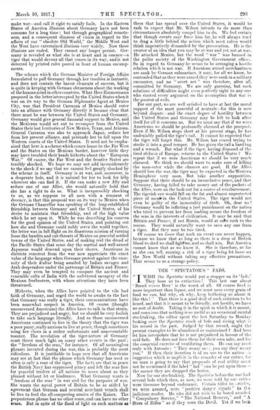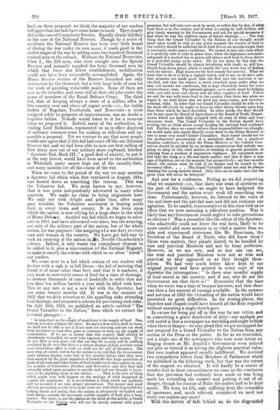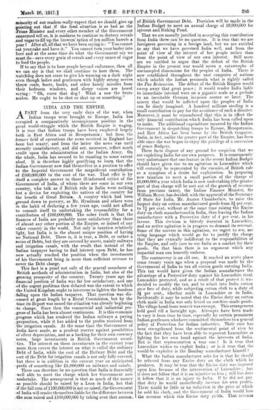THE " SPECTATOR'S " FADS.
" IWISH the Spectator would put a stopper on its fads.' They bore us to extinction ! This last one about Bread versus Beer ' is the worst of all. Of course food more important than liquor, and we must save every grain of food we can, but why, oh why, keep bothering us about it like this I " That there is a good deal of such criticism to b.) heard, and that it is meant to be friendly, not hostile, we have no sort of doubt. Taking it in the spirit in which it is meant, and conscious that nothing is so useful as an occasional mental stocktaking, the editor spent the last Saturday to Monday looking over the Spectator stock of fads and seeing what i his record in the past. Judged by that record, ought the present examples to be abandoned or maintained ? And here let him interpolate that he is not prejudiced in favour of the said fads. He does not love them for their own sake, and for the congenial exercise of ventilating them. He can say moat truly with Antonio : " They weary me ; you say they weary you." If then their iteration is of no use to the nation---a suggestion which is implicit in the remarks of our critics, for no man is going to say that proposals of real utility must not be mentioned if the label " fad ' can be put upon them— the sooner they are dropped the better. Now for our stocktaking. The Spectator before the war had several fads which then, as now, we were told by our critics were tiresome beyond endurance. Certain titles to I rtieles, wo were assured) were " positive danger signals " to do judicious reader. He who did not wish to be bored avoided " Compulsory Service," " The National Reserve," and " A Store of Rifles " as if they were tho Devil. Yet if we look back on these proposals we think the majority of our readers will agree that our fads have come home to roost. They clearly did in the case of Compulsory Service. Equally clearly did they in the case of the National Reserve. Though by a series of accidents the National Reserve has been very little heard of during the war under its own name, it made good in the earlier stages of the war by adding some two hundred thousand trained men to the colours. Without the National Reservists, Class I., the E10 men, who went straight into the Special Reserve and instantly supplied the forty thousand men by which that force was below establishment, mobilization could not have been successfully accomplished. Again, the Home Service section of the Reserve furnished not only instructors by the thousand, but a very large body of men for the work of guarding vulnerable points. Some of them are now in the trenches, and some still at their old jobs under the name of members of the Royal Defence Corps. The third fad, that of keeping always a store of a million rifles in this country over and above all urgent needs—i.e., for visible bodies of Regulars, Territorials, and Reservists—a store assigned solely to purposes of improvisation, was no doubt a hopeless failure. Nobody would listen to it for a moment when we proposed it. Indeed, many of the authorities, in- cluding Lord Nicholson, represented us as in effect deprived of ordinary common-sense for making so ridiculous and im- possible a proposal. Yet we venture to say that most people would now agree that if this fad had come off like our National Reserve fad, and we had been able to arm our first million of New Army men out of our military store cupboard, labelled " Spectator Fad, Mark III.," a good deal of anxiety, to put it at the very lowest, would have been saved to the authorities in Whitehall, many names kept out of the casualty-lists, and many months cut off the course of the war.
When we come to the period of the war we may mention a Spectator fad which when first ventilated in August, 1914, was hooted down as something like treason. That was the Volunteer fad. We must hasten to say, however, that it was quite independently advocated in many other quarters. We make no claim to being originators here. We only say with delight and pride that, after many past troubles, the Volunteer movement is bearing noble fruit in every town and county. It is the force upon which the nation is now relying for a large share in the work of Home Defence. Another war fad which we began to advo- cate in 1914, and have advocated ever since, was the arraying, not only of the military part of the nation, but of the whole nation, for war purposes—the assigning o f a war duty to every man and woman in the country. We h ave got half-way to such an arraying of the nation mar. Neville Chamberlain's scheme. Indeed, it only wants the compulsory element to be added to it, Plus a rejuvenation of the National Register, to make it exactly the scheme with which we so often " bored " our readers.
We come next to a fad which certain of our readers will declare with a sigh is in full bloom—the fad of insisting that bread is of more value than beer, and that it is madness, if you want to save every ounce of food for a time of shortage, to destroy thousands of tons of foodstuffs in order that not less than ten million barrels a year shall be filled with beer. This at any rate is not a new fad with the Spectator, but one some twenty months old. It was in the summer of 1915 that we drew attention to the appalling risks attending food shortage, and proposed a scheme for preventing such risks. On 314 10th, 1915, we published an article entitled " The Grand Victualler to the Nation," from which we extract the essential passages :— "As important as the supply of munitions is the supply of food. One, indeed, is useless without the other. No matter how much shell we have, we shall not be able to use it if our men are starving and are too weak from privation to load their guns or continue to keep up the supply of ammunition. If we are to ensure that this country shall always be abundantly victualled, we must take vigorous and timely action. If we do not, there is very grave risk that one day the country will be suddenly awakened by the news that there is a serious shortage of food, and that unless some tremendous effort is made we shall run the risk of starvation. The next step, of course, will be for the nation to be told that the Government made anxious inquiry some four or five months before, that they were then assured by the great importers of foodstuffs that huge quantities of grain of all sorts and other forms of food would reach this country in, say, he months of September, October, and November, and that they had naturally relied upon promises so specific and had not thought it neces- sary to do anything more in the matter. . . . That is the sort of thing which might very well happen on the analogy of what happened as regards the munitions. It is nevertheless a thing which can perfectly well be avoided if wo take proper precautions. The proper and most efficient precaution to take is to make some one indiriidual responsible for looking ahead and seeing that the nation is adequately victualled and shall always contain the necessary current supplies of food plus a large reserve. We want, to use the-phrase-at the head of thiaartiele, .a Grand
Victualler to the Nation. who will not be merely content with paper +00.~
promises,-but will take note week by week, or rather day by day, Of Whali- food there is in the country and of what is coming in, and, further, wilt': give timely warning to the Government and ask for special measures if and when he sees the slightest signs of future shortage. . . . The first- thing that the Grand Victualler to the Nation of our thought would insist upon would be that at any given moment the reserve of food in - the country should be sufficient for at least five or six months longer thao is customary under peace conditions. We cannot in war take risks which it is perfectly safe to take in peace time, when the legitimate automatic, safeguard of a marked rise in prices will always suck food to these shores as a powerful pump sucks water. We do not mean by this that the Grand Victualler should be always interfering with trade, or, still leas, should keep down prices, which is usually the very worst way of dealing . with the matter. High prices are the best remedy for scarcity. What we want him to do is to keep a vigilant watch, and to see, as we have said, that promises are made good, that the flow into the reservoir is un. checked, and that the reserve is never trenched upon under what wo may call normal war conditions, but is kept absolutely intact for some • extraordinary crisis. The national-granary, so to speak, must be bulging with corn and meat and cheese and all other supplies of food. Valetta we end the war with more food in the country than there was when we began it, we shall know that we have rim unnecessary, and therefore criminal, risks. In order that our Grand Victualler should be able to da his work effectively he ought to have no other duties thrown upon -him than those which we have described. In other words, the duty should not be put upon the Board of Agriculture or the Board of Trade, Depart- ments which are both fully occupied with all sorts of other and very necessary work. The Grand Victualler to the Nation should have nothing else to think about except keeping the national food cupboard' full. Further, since we cannot enforce these responsibilities too strongly, we would make him report directly every week to the Prime Minister or else to some very small Cabinet Committee. Such report should not be the perfunctory presentation of a statistical sheet, but a practical business conference, in which the Prime Minister or the Cabinet Com- mittee should be satisfied by an intimate examination that nobody-was - going to sleep in this vital matter, or trusting to general promises, or- relaxing from' a position of imperative vigilance. All concerned must- feel that the thing is a life-and-death matter, and that if there is any sign of depletion, not at the moment, but prospectively—say four months ahead—the nation must be told of its danger and be roused to the-
necessary effort. . . The Grand Victualler must not only be always: thinking but acting months-ahead. Only thus can he make sure that hits- great trust will never be betrayed."
And now for a confession. Feeling as we did, suspectiag, what we suspected—i.e., that there was want of alertness on the part of the Cabinet—we ought to have badgered the Government and the nation every week till something, was done. Unfortunately, however, we listened to the voice of the anti-bore and the anti-fad man and did not continue our agitation. To be candid, representatives of this class told us ire effect that we were assuming a ridiculous position. Was it likely that any Government would neglect to take precautions- so obvious I Was a journalist like the editor of the Spectator,- who admittedly could not know the real facts, likely to be more -careful and more anxious in so vital a matter than an able and experienced statesman like Mr. Runciman, the' President of the Board of Trade, who did know them ? These were matters, they plainly hinted, to be handled by wise and practical Ministers and not by fussy publicists; However, as we see now, and as any one can see,. the wise and practical Ministers were not as wise and- practical as they appeared or as they thought them- selves. We had very much better have kept to our original project and have printed in every copy of the Spectator the interrogation : " Is there nine months' supply, of food stored in the country, and if not, why do not the Government see that there is ? " Remember that the time- when we wrote was a time of bumper harvests, and that there was then a fair amount of tonnage available. In the summer and autumn of 1915 the victualling of the nation would have presented no great difficulties. As for storing-places, the- churches and chapels could have housed all the flour required' without unseating a single church-goer. In excuse for being put off in this way by our critics, and so committing a grave dereliction of duty—our apologia pro vita nostril is that a newspaper is a watchdog and ought to bark' when there is danger—we may plead that we got no support for our proposal for a Grand Victualler to the Nation from any section of the Press or the public. As far as we remember,- not a single one of the newspapers who were most intent on flinging atones at Mr. Asquith's Government even noticed' our plea or treated it as having the slightest practical value.i Our own readers appeared equally indifferent. We received' two sympathetic letters from Members of Parliament which' we published in the following -week, but that was the extent' of the support we obtained. It will hardly be a source of wonder that in these circumstances we came to the conclusion- that due provision had evidently been made or was being made for victualling the country and putting it out of all danger, though for reasons of State the matter had to be kept' secret. We were, we felt, only Buffeting from the cowardice of ignorance, and, much relieved, considered we need not worry our readers any more ! "With this history or lads -behind us, do- the divrtintieff sonority of our readers.really expect that we should., give up liointing out that if the .food situation is as had ,as the rime Minister and every other member of the Government oancerned toll us, it is, madness to continue to destroy cereals .and sugar to sill up the brewers' ration of ten million barrels a year I After all, all that we have been saying is : " You cannot eat your cake and have it." You cannot turn your barley into beer and at the same time do what the Government say we must, do—save every grain of cereals and every ounce of sugar to feed` the people. If to say that is to bore people beyond endurance, then all we can say is that we shall continue to bore them. The watchdog does not cease to give his warning on a dark night even though ladies and gentlemen with highly strung nerves • throw coals, boots, books, and other handy missiles from their bedroom windows, and sleepy voices are heard saying : " Oh, curse that dog ! What a row the brute makes. He ought to be shot or shut up or something."




































 Previous page
Previous page